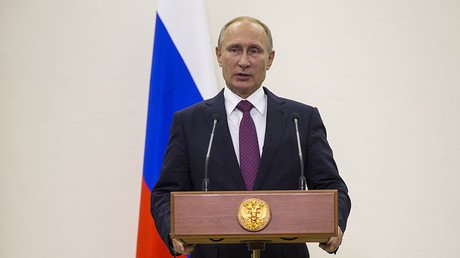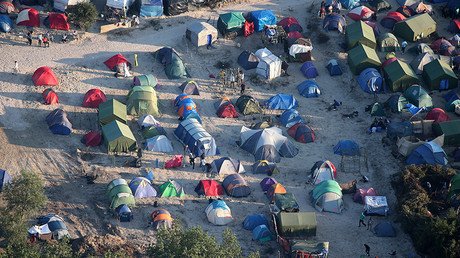EU fails to agree on new Russia sanctions, Tusk claims Moscow aims to ‘weaken’ bloc
EU leaders reportedly clashed on Russia during a summit Thursday, with some willing to include a threat of new sanctions over Syria in a final statement and others opposing the move. In the end, only individual leaders publicly spoke on the threat.
Leaders of the 28 countries gathered in Brussels to discuss the most pressing topics facing the EU, such as a response to the ongoing migrant crisis, looming Brexit negotiations, and a possible new batch of sanctions against Moscow over what some of the members insist is a negative role in Syria.
While there were reports of a strong-worded draft statement that would include an explicit threat of sanctions to Russia in the works, the leaders reportedly fell short of reaching a consensus on the issue, dropping it off the final version, Reuters reported.
Italy’s PM Matteo Renzi was one who openly opposed the possibility of a new round of restrictive measures against Moscow.
“We should do everything possible for a peace deal in Syria but it’s difficult to imagine that this should be linked to further sanctions on Russia,” Renzi said, as cited by Reuters.
Contrary to reports, Austrian Chancellor Christian Kern said that “no one demanded sanctions” on the first day of the summit, adding that the members “made an important step forward” in drawing up a concerted strategy in dealing with Russia, as cited by RIA Novosti.
German Chancellor Angela Merkel, on the other hand, advocated for a more stringent approach if Russia continues to carry out its airstrikes in the rebel-held areas of Aleppo.
“I think even if the bombings remain as intensive as they had been previously, this will be a ground for considering further actions,” she said, as reported by TASS.
READ MORE: NATO bets on ‘strong defense, deterrence & dialogue’ with Russia – Stoltenberg
Earlier, the Financial Times reported citing officials that “up to one-third” of member states, including Austria, Spain, Greece and Cyprus, did not back the prospect of new economic measures against Russia.
Nevertheless, European Union President Donald Tusk took a rather harsh stance as he told journalists that members of the meeting touched upon “all sorts of Russian hostilities”, including alleged “airspace violations”, “information campaigns,” “cyber-attacks” as well as accusing Moscow of meddling into the “political processes in the EU and beyond.”
“Given these examples, it is clear that Russia's strategy is to weaken the EU,” Tusk claimed.
However, he then said that “creating tensions with Russia is not our aim,” adding that the EU is “always” up for a dialog with Russia.
The EU member-states also appeared to have made little progress on a number of economic issues. The Comprehensive Economic and Trade Agreement with Canada (CETA) ended up in limbo after being rejected by Belgian regional Walloon government late Thursday, which cited concerns over competition from multinational corporations.
READ MORE: EU to push through Canadian trade deal despite Belgium split
Another key deal, EU-Ukraine association agreement, is also unlikely to be sealed during the summit, as Dutch Parliament still refuses to ratify it.
"On the one hand a Dutch 'no' could potentially have an effect on the region, on the other hand I do not want the Dutch voter to feel cheated," said the country’s PM Mark Rutte.
EU leaders managed to find some common ground on migration as they backed the plans to offer trade deals and financial stimuli to African countries seeking to curb uncontrollable flows of arrivals stemming from the continent.
"It is not just about money, it is about substantially improving the capabilities and the chances of people in these African countries and to give hope," Merkel said.
EU leaders have been urged to come to an agreement on a mechanism for suspending the visa-free regime “within the next few weeks.” There is currently no emergency procedure in place, which means every member state must approve the cancellation of a visa-free regime agreement with other states for it to take effect. Creating such a mechanism is viewed as a necessary precaution if the visa regime with Turkey is to be liberalized, as has been long anticipated by Ankara as part of the EU’s obligations in fulfilling their migration control deal.
READ MORE: UK to help Ankara ‘in any way’ to join EU, Boris Johnson says on first post-Brexit visit to Turkey
No breakthrough has been made on the terms of Brexit, with Tusk stressing that the negotiations will be launched only after UK invokes Article 50 of Lisbon Treaty that start a formal process of leaving the block.
"There will be no negotiations before Article 50 is triggered by the UK," Tusk said, adding that he “would be the happiest one” if the referendum vote would be reversible.














